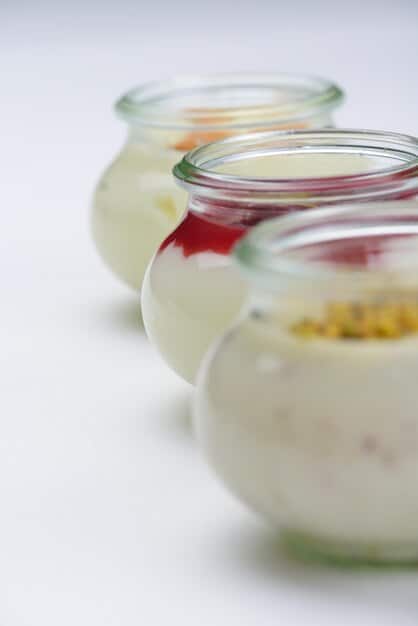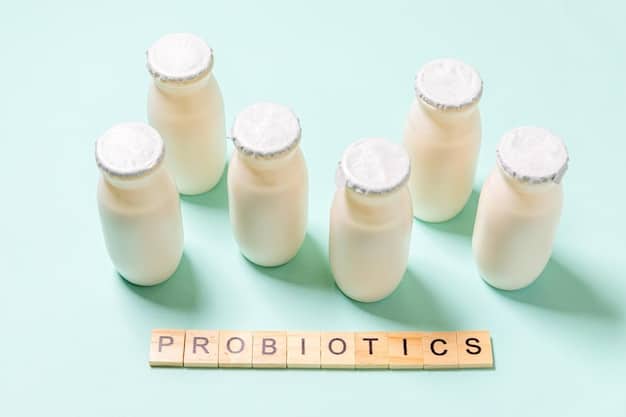The Gut-Brain Connection: Probiotics for a 10% Mood Boost

Recent research highlights the profound connection between the gut and the brain, suggesting that probiotics can significantly impact mental well-being, potentially improving mood by up to 10% through the modulation of gut microbiota.
Feeling down? The latest scientific research is uncovering fascinating links between your gut health and your mental state. Specifically, studies suggest that probiotics, those beneficial bacteria in your gut, might just be the key to a 10% improvement in your mood. This article dives deep into the latest research on the gut-brain connection: how probiotics can improve your mood by 10%, offering practical insights to enhance your well-being.
Understanding the Gut-Brain Connection
The gut-brain connection is a bidirectional communication system linking the central nervous system and the enteric nervous system. This complex network involves neural, hormonal, and immunological pathways, all influencing both digestive and cognitive functions.
Understanding this connection is crucial for exploring novel approaches to mental health and overall well-being. Lets explore the key elements of this connection.
The Role of the Vagus Nerve
The vagus nerve, the longest cranial nerve in the body, plays a significant role in the gut-brain axis. It directly connects the brain to the gut, transmitting signals that influence digestion, heart rate, and mood.
Gut Microbiota’s Influence
The gut microbiota, the community of microorganisms residing in the digestive tract, produces neurotransmitters such as serotonin, dopamine, and GABA. These neurotransmitters can affect mood and behavior.
- Gut bacteria can synthesize neurotransmitters that travel to the brain.
- The balance of gut bacteria can impact mental health.
- Probiotics can positively influence the gut microbiota composition.
In conclusion, the gut-brain connection is a critical pathway influencing both physical and mental health. Understanding the roles of the vagus nerve and gut microbiota can lead to innovative strategies for improving mood and overall wellness.

The Impact of Gut Health on Mood
The health of your gut can significantly impact your mood. Disruptions in the gut microbiome can lead to inflammation and imbalances in neurotransmitter production, affecting mental well-being.
Maintaining a healthy gut is essential for emotional stability and cognitive function. Exploring how gut health affects mood offers valuable insights.
Inflammation and Mood Disorders
Chronic inflammation in the gut can trigger systemic inflammation, which has been linked to mood disorders such as depression and anxiety. Reducing gut inflammation can improve mental health.
Neurotransmitter Production in the Gut
The gut produces a significant portion of the body’s serotonin, often referred to as the “feel-good” neurotransmitter. Imbalances in gut bacteria can disrupt serotonin production, affecting mood.
- Gut microbiota can influence the synthesis of serotonin and dopamine.
- Dysbiosis, an imbalance in the gut, can lead to mood disturbances.
- A balanced gut microbiome is crucial for mental well-being.
In conclusion, the gut plays a pivotal role in mood regulation through inflammation control and neurotransmitter production. Prioritizing gut health can lead to improved emotional and mental well-being.
Probiotics: What Are They and How Do They Work?
Probiotics are live microorganisms that, when administered in adequate amounts, confer a health benefit on the host. They work by improving the gut microbiota and enhancing gut barrier function.
Knowing what probiotics are and how they function is essential for leveraging their benefits. Understanding their mechanisms helps maximize their impact on health.
Types of Probiotics
Common types of probiotics include Lactobacillus, Bifidobacterium, and Saccharomyces. Each strain has different properties and benefits, making it important to choose the right probiotic for your needs.
Mechanisms of Action
Probiotics work by modulating the gut microbiota, producing beneficial substances such as short-chain fatty acids (SCFAs), and strengthening the gut barrier. These actions can reduce inflammation and improve nutrient absorption.
- Probiotics compete with harmful bacteria in the gut.
- They enhance the production of beneficial compounds.
- Probiotics can improve the integrity of the gut lining.
In summary, probiotics are beneficial microorganisms that enhance gut health through various mechanisms. Selecting the appropriate strain and understanding their functions is key to achieving optimal health benefits.
Research on Probiotics and Mood Improvement
Numerous studies have investigated the effects of probiotics on mood, showing promising results. Probiotics have been found to reduce symptoms of anxiety and depression in some individuals.
Exploring the research on probiotics and mood improvement provides evidence-based insights into their potential benefits. Evaluating the findings helps determine their effectiveness and applicability.
Clinical Trials
Clinical trials have demonstrated that specific probiotic strains can improve mood scores and reduce perceived stress levels. These studies provide evidence for the efficacy of probiotics in mental health.
Meta-Analyses
Meta-analyses, which combine the results of multiple studies, have confirmed the positive impact of probiotics on mood. These comprehensive reviews strengthen the evidence supporting probiotic use for mental well-being.
Example of a meta-analyses is:
- Individuals taking Lactobacillus and Bifidobacterium strains experienced significant improvements in mood.
- Probiotics can be effective in managing symptoms of anxiety and depression.
- Further research is needed to determine the optimal strains and dosages.
In conclusion, research consistently shows that probiotics can positively influence mood. Clinical trials and meta-analyses support their use as a complementary therapy for improving mental health.
How to Choose the Right Probiotic
Selecting the right probiotic involves considering factors such as the specific strains, the condition you’re trying to address, and the quality of the product. Not all probiotics are created equal.
Knowing how to choose the right probiotic ensures you maximize its benefits. Understanding the key considerations can lead to better health outcomes. Probiotics come in different forms, each with unique benefits.
Strain Specificity
Different probiotic strains have different effects. For mood improvement, look for strains such as Lactobacillus helveticus and Bifidobacterium longum, which have demonstrated benefits in clinical trials.
CFU Count
CFU (colony-forming units) indicates the number of live bacteria in a dose. A higher CFU count doesn’t always mean a better product, but it ensures you’re getting an adequate amount of live bacteria.

- Choose strains that have been clinically proven to improve mood.
- Consider the CFU count to ensure an adequate dose.
- Look for products that have undergone third-party testing.
In summary, selecting the right probiotic involves considering strain specificity, CFU count, and product quality. Choosing a probiotic that aligns with your specific needs can lead to better results.
Incorporating Probiotics into Your Diet
Incorporating probiotics into your diet can be achieved through probiotic-rich foods and supplements. Fermented foods are a natural source of probiotics that can enhance your gut health.
Knowing how to incorporate probiotics into your diet is crucial for reaping their benefits. Understanding the various options helps you make informed choices. Here are some tips and guidelines for incorporating probiotics successfully.
Probiotic-Rich Foods
Yogurt, kefir, sauerkraut, kimchi, and kombucha are excellent sources of probiotics. Consuming these foods regularly can improve your gut microbiota and support mental well-being.
Probiotic Supplements
Probiotic supplements offer a concentrated dose of beneficial bacteria. They are available in various forms, including capsules, powders, and liquids. Choosing a high-quality supplement can ensure you receive an effective dose.
- Include fermented foods in your daily diet.
- Choose a probiotic supplement with clinically proven strains.
- Be consistent with your probiotic intake for optimal results.
In conclusion, incorporating probiotics into your diet through both foods and supplements can significantly improve your gut health and mood. Consistency and variety are key to achieving lasting benefits.
Lifestyle Factors to Support Gut-Brain Health
Beyond probiotics, various lifestyle factors can support the gut-brain connection. A balanced diet, regular exercise, stress management, and adequate sleep all contribute to a healthy gut and improved mood.
Adopting these habits can enhance the effectiveness of probiotics and promote overall well-being. Lets explore the key aspects of a gut-brain-friendly lifestyle.
Dietary Habits
A diet rich in fiber, fruits, and vegetables provides nourishment for beneficial gut bacteria. Limiting processed foods, sugar, and artificial sweeteners can prevent gut dysbiosis.
Stress Management
Chronic stress can negatively impact the gut microbiome. Practices such as meditation, yoga, and deep breathing exercises can help manage stress and promote a healthy gut.
- Eat a diverse diet to support a variety of gut bacteria.
- Engage in regular physical activity to improve gut motility.
- Prioritize sleep to support gut health and mental well-being.
In summary, adopting a holistic approach that includes a balanced diet, stress management, and regular exercise can significantly support gut-brain health. Combining these lifestyle factors with probiotic intake can lead to improved mood and overall well-being.
| Key Point | Brief Description |
|---|---|
| 🧠 Gut-Brain Connection | Bidirectional communication between the digestive system and the brain. |
| 🦠 Probiotics | Live microorganisms that benefit gut health and mood. |
| 🥗 Dietary Habits | A fiber-rich diet supports beneficial gut bacteria. |
| 🧘 Stress Management | Practices like meditation can improve gut health. |
Frequently Asked Questions (FAQ)
▼
The gut-brain axis refers to the bidirectional communication system between the gut and the brain. It involves neural, hormonal, and immunological pathways that influence both physical and mental health.
▼
Probiotics can improve mood by modulating the gut microbiota, producing beneficial neurotransmitters, and reducing inflammation. These actions positively impact mental well-being.
▼
Specific strains such as Lactobacillus helveticus and Bifidobacterium longum have shown promise in clinical trials for improving mood and reducing symptoms of anxiety and depression.
▼
Yes, diet significantly impacts the gut-brain connection. A diet rich in fiber, fruits, and vegetables promotes a healthy gut microbiome, while processed foods can disrupt gut balance.
▼
The time it takes to see mood improvements with probiotics can vary. Some individuals may experience benefits within a few weeks, while others may require several months of consistent use.
Conclusion
In conclusion, the intricate connection between the gut and the brain highlights the potential of probiotics to positively influence mood. By incorporating probiotic-rich foods and supplements into your diet, along with lifestyle factors that support gut health, you can take proactive steps towards improving your mental well-being and overall quality of life.





